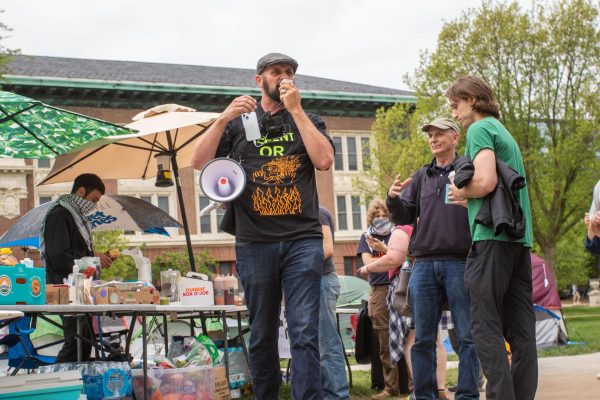Supreme Court hears case about abortion pill, reaffirms Illinois’ role in abortion access
April 22, 2023
With the recent rulings about the legitimacy of medication abortions, talk of abortion access has spurred heavy conversation as Illinois stands alone amid conservative states.
Mifepristone was first approved by the Federal Drug Administration in September of 2000. It works to block a hormone called progesterone, which is needed for pregnancy to continue.
Mifepristone is typically followed by a second FDA-approved drug, misoprostol, to clean and empty the uterus. Misoprostol is used primarily to prevent stomach ulcers and is not an abortion-inducing drug.
According to a study by the Guttmacher Institute, this two-step regimen accounts for over half of the abortions performed in the United States.
On April 7, a federal judge in the Northern District of Texas approved a lawsuit challenging mifepristone’s federal approval.
Get The Daily Illini in your inbox!
Within the hour, a second lawsuit was filed out of the state of Washington. It directly contradicted the Texas lawsuit and advocated for the legitimacy of mifepristone. Sixteen other states, including Illinois and Washington D.C., were also plaintiffs in the case.
In an emergency appeal on April 14, the Biden administration requested that the Supreme Court temporarily block the rulings of lower districts to quickly ban access to mifepristone. This would keep mifepristone legal while the justices made their decision.
On Friday, the Court ruled that access to mifepristone can stay, siding against the lower court-ruled restrictions banning its distribution. There still stands a claim against its FDA approval that is under consideration.
The Supreme Court had stalled the case, the first major one relating to abortion access since Dobbs v. Jackson last summer. A decision was expected on Wednesday, but the Court did not release one until Friday.
Illinois, being one of the states challenging the original Texas ruling, stands alone among a midst of states with strict rules on abortion.
Awais Vaid, the director of McKinley Health Center at the University, said Illinois is considered a “safe haven” state. The expanded protections signed by Gov. JB Pritzker gave rise to a higher influx of out-of-state patients coming to Illinois for reproductive care.
Vaid also noted that though McKinley does not offer abortion services, nor do they prescribe medications like mifepristone and misoprostol, they do offer family planning services and other women’s health specialized clinics.
“Illinois is also considering expanding the morning-after, or emergency contraception for higher education,” Vaid said. “(That means) all institutions of higher education will be required to provide emergency contraception at a reduced cost.”
According to Vaid, McKinley already dispenses the morning after pill. However, this would broaden access to continue to support the University community.
Currently, a student can receive one emergency pill once per semester. If the considered expansion were to pass, it would be available at most times for a greatly reduced cost, “if not free,” he said.
Vaid also described that the ruling on mifepristone will not greatly affect C-U as compared to other metropolitan areas in surrounding states. He emphasized the importance of Illinois’ political tendencies in context of its geographic location.
Mara Pliskin, abortion navigation program manager for Planned Parenthood – Champaign Health Center, said that since the Dobbs ruling last summer, Planned Parenthood Illinois has seen patients from 35 different states.
Pliskin said that it was more than just the obvious geographic proximity that factored into why so many more patients started coming. Other factors included partnering with other local clinics to make sure patients could choose the best option for themselves.
“Specifically in Champaign, we expanded our services to go to a higher gestation limit and (we are able to) see more patients in those sites,” Pliskin said. “Pretty much immediately as soon as we did that, we started seeing a ton of patients from other states directly to our Champaign center.”
Because abortion is protected in Illinois, PPIL will continue to offer mifepristone and misoprostol as an option to abortion-seekers. Even so, Pliskin worries about the repercussions of this case.
Pliskin said that everyone will be affected by this ruling, no matter the outcome.
“There’s no state that is blanket safe from these rulings,” she said. “And so we are doing our best, but we are not immune (to the repercussions).”
While the Supreme Court’s decision to support broad access to mifepristone stands, the challenge to its FDA approval is still under contingency.
“These rulings have implications in so many areas,” Pliskin said. “(And they) are really about limiting autonomy and limiting choice.”






